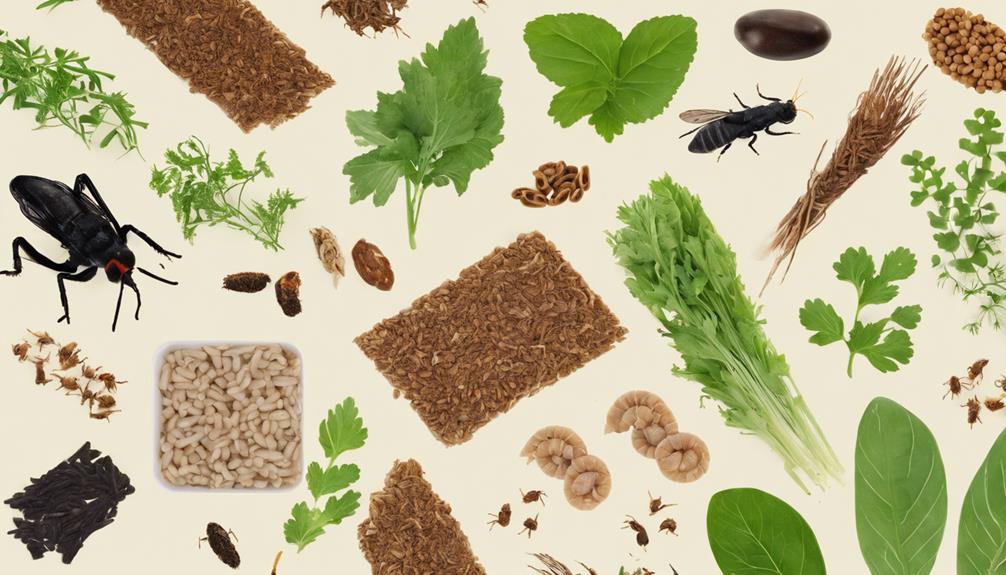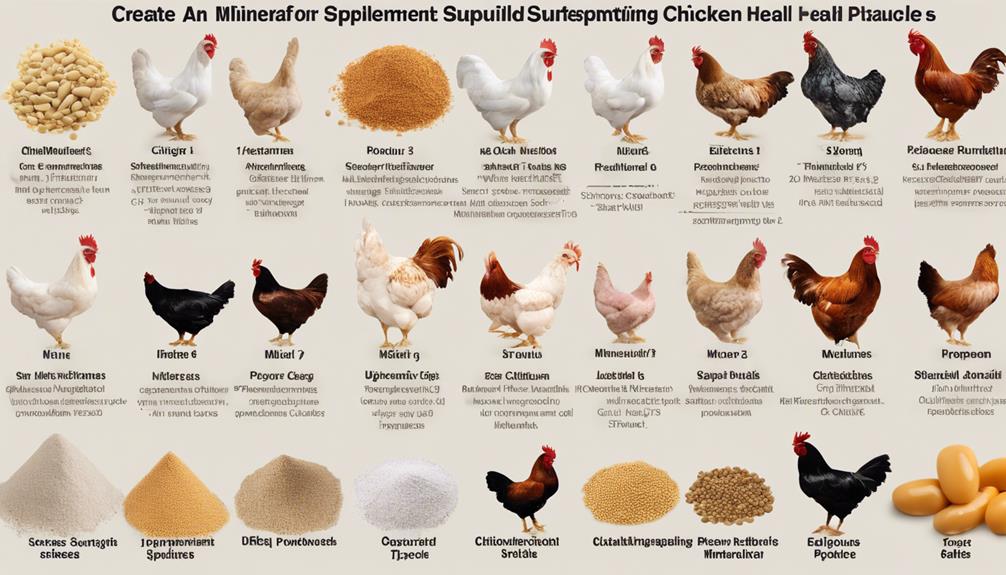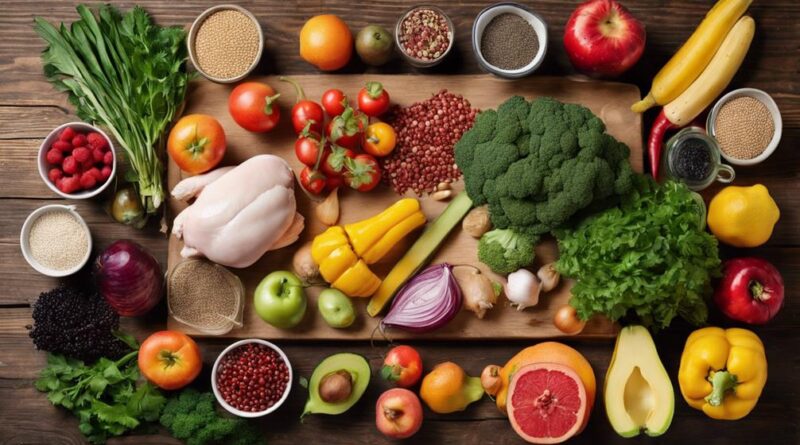Top 10 Foods for Optimum Chicken Health"
When it comes to ensuring the best health for your chickens, the food they consume plays a crucial role. From whole grains to fresh fruits and vegetables, each component adds essential nutrients to their diet. But have you ever considered the significance of protein sources like insects and mealworms? These, along with a few surprising additions, contribute to the overall well-being of your feathered friends. So, what other foods are on the list for optimum chicken health? Stay tuned to uncover the top 10 foods that will keep your flock thriving and laying quality eggs.
Whole Grains for Chickens
Incorporating whole grains into your chicken's diet provides essential nutrients and promotes overall health and well-being. Nutrient-rich grains are a crucial component of a balanced chicken diet, offering a variety of vitamins, minerals, and fiber necessary for optimal health. When selecting grains for your chickens, consider options such as oats, barley, wheat, and corn as they're packed with essential nutrients.
Whole grains serve as excellent grain alternatives for chickens, offering a more natural and wholesome option compared to processed grains. These unrefined grains retain their nutrient content, providing a healthier choice for your flock. When feeding your chickens whole grains, ensure they're clean, dry, and free from mold to prevent any potential health issues.
Including whole grains in your chicken's diet can improve their digestive health and energy levels. The fiber content in whole grains aids in digestion, promoting gut health and preventing digestive problems. Additionally, the complex carbohydrates found in whole grains provide a sustained source of energy for your chickens throughout the day.
Fresh Fruits and Vegetables
Fresh fruits and vegetables play a vital role in enhancing the nutritional quality of your chicken's diet, providing essential vitamins and minerals for their overall health and well-being. Including a variety of nutrient-rich options in your chicken's diet is crucial to ensure they receive a well-rounded nutritional intake.
When it comes to fruits, options such as berries, apples, and melons are excellent choices. Berries are packed with antioxidants and vitamins that can boost your chicken's immune system. Apples provide fiber and vitamin C, while melons offer hydration and essential nutrients.
Vegetables like leafy greens, bell peppers, and carrots are also beneficial. Leafy greens like spinach and kale are rich in vitamins A, C, and K, as well as calcium. Bell peppers provide vitamin C and antioxidants, and carrots are a great source of beta-carotene, which is essential for vision health.
Protein-Rich Foods
To optimize your chicken's diet and promote their health, consider including protein-rich foods that are essential for their growth and overall well-being. Protein is a crucial nutrient for chickens as it aids in the development of muscles, feathers, and eggs. When selecting protein sources for your chickens, it's important to ensure a proper nutritional balance to support their health and productivity.
Protein sources for chickens can come from various foods such as insects, mealworms, earthworms, and even kitchen scraps like cooked eggs or meat. Commercial chicken feeds also provide a good source of protein, typically containing soybean meal, fish meal, or other plant-based proteins. These feeds are formulated to meet the specific protein requirements of chickens at different stages of life.
Incorporating a mix of protein-rich foods into your chicken's diet can help maintain their overall health and ensure they receive the necessary nutrients for growth and development. It's essential to consider the protein content of the food you provide to your chickens to prevent deficiencies or excesses that can lead to health problems. By offering a variety of protein sources and monitoring their intake, you can help your chickens thrive and lead a healthy life.
Healthy Seeds and Nuts
For optimal chicken health, consider adding a variety of healthy seeds and nuts to their diet to ensure a well-rounded nutritional intake. Seeds such as flaxseed, chia seeds, and sunflower seeds are packed with essential nutrients that can benefit your chickens. Flaxseeds, for instance, are rich in omega-3 fatty acids, which promote healthy feathers and egg production. Chia seeds are loaded with antioxidants, fiber, and protein, contributing to overall health and immunity in chickens. Sunflower seeds provide a good source of vitamin E, an important antioxidant that supports the immune system.
Nuts also offer various benefits for chicken health. Walnuts, for example, are high in omega-3 fatty acids and protein, aiding in feather growth and strength. Almonds are a good source of vitamin E and healthy fats, which are essential for maintaining healthy skin and feathers. Peanuts provide a protein boost and contain beneficial nutrients like niacin and folate, supporting overall chicken well-being.
Incorporating a mix of seeds and nuts into your chickens' diet can enhance their seed nutrition and provide them with a diverse range of nutrients. Remember to offer them in moderation and ensure they're appropriate for your specific flock. By including these healthy seeds and nuts, you can promote optimal health and vitality in your chickens.
Dairy Products for Chickens
Incorporating dairy products into your chickens' diet can provide essential nutrients that support their overall health and well-being. Dairy products offer a range of benefits to chickens, including calcium sources for strong eggshells and bones, as well as probiotic benefits that aid in digestion and overall gut health. Here are some key points to consider when including dairy in your chickens' diet:
- Calcium Sources
Dairy products such as yogurt and cheese are excellent sources of calcium, which is crucial for laying hens to produce strong eggshells. Calcium deficiency can lead to brittle eggs and health issues in chickens, so ensuring they have access to sufficient calcium is vital for their well-being.
- Probiotic Benefits
Dairy products like yogurt contain probiotics, which are beneficial bacteria that support the digestive system of chickens. Probiotics help maintain a healthy balance of gut flora, improve nutrient absorption, and boost the immune system. Including probiotic-rich dairy in your chickens' diet can contribute to their overall health and vitality.
- Feeding Recommendations
When feeding dairy products to chickens, opt for plain varieties without added sugars or artificial flavors. You can offer small amounts of yogurt as a treat or mix it with their feed. Cheese can also be given in moderation as a source of calcium and protein. Remember to monitor your chickens' intake to prevent overconsumption.
Leafy Greens and Herbs
When considering the dietary needs of your chickens, exploring the benefits of incorporating leafy greens and herbs can significantly enhance their overall health and well-being. Leafy greens and herbs aren't only a great source of essential nutrients but also provide herbal supplements with medicinal benefits that can contribute to your chickens' optimal health. Chickens have a natural inclination towards foraging behavior, and including leafy greens and herbs in their diet can mimic their natural diet, promoting physical activity and mental stimulation.
Leafy greens such as spinach, kale, and Swiss chard are rich in vitamins A, C, and K, as well as minerals like calcium and iron, all of which are vital for chicken health. These greens also contain antioxidants that help boost the immune system and protect against diseases.
Herbs like oregano, parsley, and basil offer not only flavor but also medicinal properties that can support your chickens' well-being. Oregano, for example, is known for its antimicrobial and antioxidant effects.
Insect-Based Foods

Utilizing insect-based foods in your chickens' diet can significantly boost their protein intake and provide essential nutrients for optimal health and development. Insect protein is a highly sustainable option for supplementing your chickens' diet. Here's why insect-based diets are beneficial for your flock:
- High in Protein: Insects are rich in protein, making them an excellent source of this essential nutrient for chickens. Protein is crucial for muscle development, egg production, and overall health in poultry.
- Nutrient-Dense: Insect-based diets offer a wide range of essential nutrients that are vital for chickens' growth and well-being. These include amino acids, vitamins, and minerals that support various physiological functions in your birds.
- Sustainability: Opting for insect-based foods promotes sustainability in your chicken farming practices. Insects can be raised efficiently with minimal environmental impact, making them a viable eco-friendly alternative to traditional poultry feed sources.
Essential Vitamins for Chickens
To ensure optimal health and development in your chickens, it's crucial to provide them with essential vitamins that support their physiological functions and overall well-being. Vitamin deficiencies can lead to various health issues in chickens, impacting their growth, egg production, and immune system. To prevent such deficiencies, it's important to ensure that your chickens receive adequate amounts of vitamins through their diet.
Vitamin A is vital for good vision, growth, and immune function in chickens. It can be found in sources such as dark leafy greens, carrots, and pumpkins. Vitamin D plays a crucial role in calcium absorption and skeletal development, with sunlight exposure being a natural source. Vitamin E acts as an antioxidant, protecting cells from damage, and is present in foods like seeds and nuts.
For a well-rounded diet, consider providing your chickens with a commercial feed that's specifically formulated to meet their vitamin requirements. Additionally, offering a variety of fresh fruits and vegetables can also help ensure they receive essential vitamins. Always follow dietary recommendations from poultry nutritionists or veterinarians to maintain a balanced vitamin intake for your chickens.
Mineral Supplements

Consider incorporating a balanced mineral supplement into your chickens' diet to support their overall health and physiological functions. Minerals play a crucial role in maintaining dietary balance and ensuring optimal health for your flock. Here are some key points to keep in mind:
- Dietary Balance: A mineral supplement can help ensure that your chickens are receiving all the essential minerals they need for proper growth, development, and overall health.
- Calcium Intake: Calcium is a vital mineral for chickens, especially for egg-laying hens. Adequate calcium intake is essential for shell strength and quality, which directly impacts egg production.
- Shell Strength and Egg Production: Calcium deficiency can lead to thin, weak eggshells, making them more prone to breakage. By supplementing your chickens' diet with the right minerals, particularly calcium, you can help maintain strong eggshells, leading to improved egg production and overall flock health.
Fermented Foods for Chickens
Incorporate fermented foods into your chickens' diet to enhance their digestive health and overall well-being. Fermented foods are a valuable addition to your chickens' nutrition due to their positive impact on gut health. These foods undergo a fermentation process that results in the growth of beneficial bacteria, providing probiotic benefits to your flock.
One of the key advantages of incorporating fermented foods into your chickens' diet is the promotion of gut health. The probiotics present in fermented foods help maintain a healthy balance of microorganisms in the digestive system, which is essential for proper nutrient absorption and overall well-being. Improved gut health can lead to better immunity, increased disease resistance, and enhanced overall health in chickens.
Fermented foods can also aid in boosting the immune system of your chickens. The probiotics in these foods help stimulate the production of beneficial enzymes and vitamins that contribute to a robust immune response. By supporting your chickens' immune function, fermented foods can help prevent common illnesses and keep your flock healthy and thriving.
Frequently Asked Questions
Can Chickens Eat Spicy Foods?
Chickens shouldn't eat spicy foods due to the dangers they pose. Spicy ingredients can irritate their digestive system, leading to discomfort and potential health issues.
It's crucial to adhere to dietary restrictions to ensure your chickens' well-being. Avoid feeding them any foods with high spice levels to prevent digestive problems and keep your flock healthy.
It's best to stick to safe and appropriate foods for your chickens' diet.
Are There Any Foods That Chickens Should Avoid?
When it comes to foods to avoid for chickens, spicy food should be at the top of your list. Spicy foods can cause digestive issues and discomfort for chickens. It's best to steer clear of feeding them anything with high spice levels to keep your flock healthy and happy.
Stick to a balanced diet of chicken-friendly foods to ensure their well-being and overall health.
How Often Should Chickens Be Fed Treats?
You should aim to incorporate treats in your chickens' feeding schedule sparingly to maintain dietary balance. Avoid overindulging them as it can lead to health issues.
Opt for nutritional supplements and healthy snacks, such as fruits and vegetables, to provide additional nutrients. Keep in mind that treats should only make up a small portion of their overall diet to ensure they receive the necessary nutrients from their main feed.
Can Chickens Eat Cooked Foods?
Yes, chickens can eat cooked foods, but it's important to note the difference between raw and cooked items. While raw foods can sometimes pose a health risk due to potential bacteria, cooked foods are generally safe for chickens.
Cooking can also enhance the digestibility and nutritional benefits of certain foods, making them a healthy addition to your chickens' diet. Remember to offer a balanced diet to ensure your chickens' optimum health.
What Foods Can Help Boost Egg Production in Chickens?
To help boost egg production in your chickens, consider incorporating the following components into their diet:
- Probiotic supplements can aid in digestion and overall health.
- Nutritious snacks provide essential vitamins and minerals.
- Herbal remedies can support reproductive health.
- Calcium-rich veggies like kale and broccoli help strengthen eggshells.
Conclusion
In conclusion, incorporating a variety of whole grains, fresh fruits and vegetables, protein-rich foods, healthy seeds and nuts, dairy products, insect-based foods, essential vitamins, mineral supplements, and fermented foods into your chickens' diet is crucial for their overall health and well-being.
By providing a balanced and nutrient-rich diet, you can ensure that your chickens thrive, lay quality eggs, and maintain optimal health.
Remember, a healthy diet is key to happy and productive chickens.
